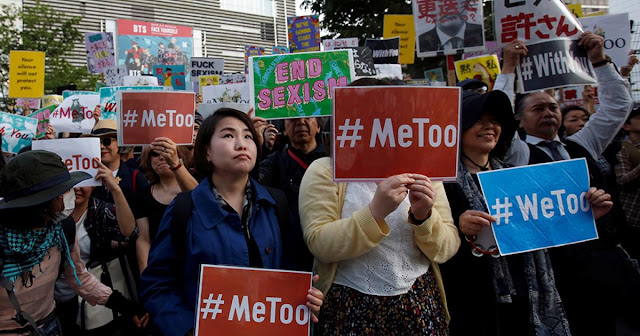Japan and Gender equality: a quick insight
 The news of the journalist Shiori Ito, a Japanese woman who broke the silence on rape in Japan has made the headlines all over the world. She has become a symbol of the #metoo movement in Japan, denouncing that Shinzo Abe's government and the police discouraged her sexual assault investigations.
The news of the journalist Shiori Ito, a Japanese woman who broke the silence on rape in Japan has made the headlines all over the world. She has become a symbol of the #metoo movement in Japan, denouncing that Shinzo Abe's government and the police discouraged her sexual assault investigations.
But is Japan really so bad for gender equality?
Japanese men will say that their country puts "lady first", they see being a housewife as a privilege and, in a society where you work shift can last 11 hours per day, it is not so difficult to understand them/ Also, they blame the fact that women can have many reduced price for cinema or lunch menus (well actually Japanese women having a lot of free time are just a good business target) or have nicer and bigger toilets or special train cars against "chikan", the perverts. However, all these policies are only strengthening gender division.
In fact Japan ranks bottom among the G7 countries for gender equality and Japanese minister claims Japan has recently found itself in the public eye for failing to recognise gender equality in the wake of the global #MeToo movement. In particular, despite being one of the safest countries in the world and despite Tokyo being the safest city in the world in 2019, the issues as social pressure (Heels for women are ‘occupationally necessary’ while glasses should not be worn because they look bad) and sexual harassment are prevalent in the country.
A recent survey of 1,000 working women found that 42.5 per cent had experienced sexual harassment and that more than 60 per cent did not report it, while a report last year by the government’s gender equality bureau showed nearly 60 per cent of female victims of rape kept it to themselves due to fears of being publicly shamed. In 2017 the Tokyo metropolitan police department recorded almost 900 cases of groping and other types of harassment on trains and subways in the Japanese capital. In 2018 a number of medical universities in Tokyo were found to meddle with entrance exam scores to deliberately choose men over female applicants.
Furthermore, this year there were few verdicts that seemed incredibly unjust, allowing men to get away with sexual assault: as for the first case, the Fukuoka Court found a man innocent of rape after having non consensual sex with a woman he had gotten so drunk that she lost consciousness; as for the second case, the father of a 19-year-old girl was found not guilty of sexually abusing her since she was 12. In the first case, the drunk woman was blamed of didn't say anything, in the second case, the girl was blamed of not sufficiently refuse the father's sexual advances. On March 2019, another 14-year-old girl who accused her father of sexually abusing her for two years was considered unreliable by the judge.
Fortunately, lately, thanks to people like Shiori Ito and other campaigners and sexual abuse survivors' claims, there are new hopes for all non-consensual sex to be deemed a crime and make new policies for more gender equality.




Comments
Post a Comment